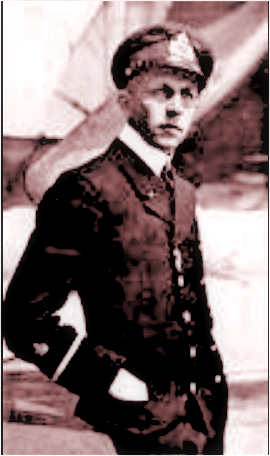Stories about prisoner of war escapes are always much sought after. All of us can name multiple titles which gave inspiration to us about the underdog outsmarting the cruel captors. For myself, I enjoyed Dragon Master: The Kaiser’s One-Man Air Force in Tsingtau, China 1914 (by Robert E. Whitaker, Compass Books, 1994) which chronicled the escape of German Navy Lieutenant Gunther Plüschow from the Japanese and the British. But this story rivals the Plüschow saga.
 |
| Erich Killinger, 1914 |
Dwight Messimer, former lecturer in history at San Jose State University and army veteran, has given Great War aficionados another saga to add to the many stories of extraordinary daring. In this work, the author vividly portrays German midshipman Erich Killinger’s escape from Russian captivity in Siberia—a feat which borders on the impossible.
Erich Killinger grew up in the Grand Duchy of Baden. His father was a member of the privy council to Grand Duke Friedrich I of Baden. Although not part of the nobility, his family did rank itself among the elite. Killinger was groomed at a young age to honor and obey the state. A path in the army would have been expected of him, but instead he sought a position with the budding Kaiserliche Marine or navy. In 1913, after studying law and economics at Kings College in London and the University of Heidelberg, Killinger entered the Imperial Navy’s officers’ school.
Training was supposed to last for nearly a year but the declaration of war in August 1914 interrupted his training and he was sent to a squadron that patrolled Germany’s Baltic coast. The assignment was not to his liking in that it was too far from the action. A way out was to volunteer for the fledgling Imperial Navy’s air arm, which consisted of heavier and lighter than air aircraft. Killinger was slated to be an observer and was sent to school in September 1914.
Killinger, after graduating, found himself in an unarmed Rumpler 4B-II along the Livonian (Latvia) coast performing both reconnaissance and bombing raids. Finally, he was near the action and participating in it. High in the clouds he had reason to be content, but navy aircraft, and airplanes in general at the time, were fragile things. On 6 April 1915, while Killinger and his pilot were returning to their home base near Memel, the Rumpler lost its propeller which destroyed one of the landing pontoons in its arc to the sea.
Killinger’s pilot successfully executed a water landing despite the damaged landing gear and the two were perched on the one remaining pontoon. Swimming to land was not an option in the freezing Baltic water. Besides, the land was garrisoned by the Russian Army. The crew decided to stay with the half-sunk machine until a German search party might come along. Just how long that would be was anyone’s guess but it was not to be. Instead, a rowboat manned by Russian soldiers showed up first and took the crew prisoner.
 |
| German POWs in Siberia |
Killinger and his pilot, after a rough interrogation in which they were threatened with hanging or a firing squad, were bundled into the prisoner of war pipeline that entailed a lengthy journey along the Trans-Siberian railway to camps far to the east. The author’s description of POW camps is detailed and extremely interesting. All along the way Killinger planned escapes, but the sheer vastness of Siberia deterred his ambitions until the train they were on neared the Manchurian border. He and three other prisoners launched themselves off the train and into the Chinese snow to begin a trek of hundreds of kilometers to Mukden. The cold was intense and their clothing inadequate, but the real problem was finding food among what could have been a hostile population. China, at the time, was neutral; however, the Russian and Japanese armies controlled most of Manchuria and offered a reward for escapees.
Killinger and his group walked across Manchuria, trading their uniform buttons for food at friendly villages. Finally, at Mukden, Killinger entered a German network of safe houses which successfully got him to Shanghai. It was there that he was given a choice of routes that he could take to get back to Germany. He could go west crossing into Russia again or east across the Pacific and the United States. Another trip through Russia was not to Killinger’s liking, although his three companions chose that way. He chose the other.
Messimer’s narrative of Killinger’s route across the Pacific and through America is extremely interesting to say the least. There are many times when Killinger was nearly turned in because he ignored instructions to keep a low profile, but eventually he made it to New York where the pipeline ended. From there he had to be resourceful on his own. Getting across the Atlantic was far more difficult.
Eleven Months to Freedom is a saga that rivals the Odyssey. It is at times riveting and at other times frustrating in that Killinger’s actions showed his bullheadedness and rashness (perhaps due to class arrogance) to heed advice. It is of little wonder that when he finally got back to Germany, he was hard pressed to convince the authorities that he really was an escaped German naval officer. This book goes on my shelf next to Dragon Master.
Michael Kihntopf
Editor's Note: Erich Killinger returned to military service prior to the Second World War. After his commissioning in the Luftwaffe, he was found too old to fly, and was—either intentionally or ironically—assigned to command a prisoner of war camp. His methods were deemed brutal, and he was convicted of war crimes afterwards, serving a five-year sentence. One wonders if he contemplated any escape effort while he was serving his time. Below is a photo of him during the war at his camp. MH
 |
| Erich Killinger, Center |

No comments:
Post a Comment